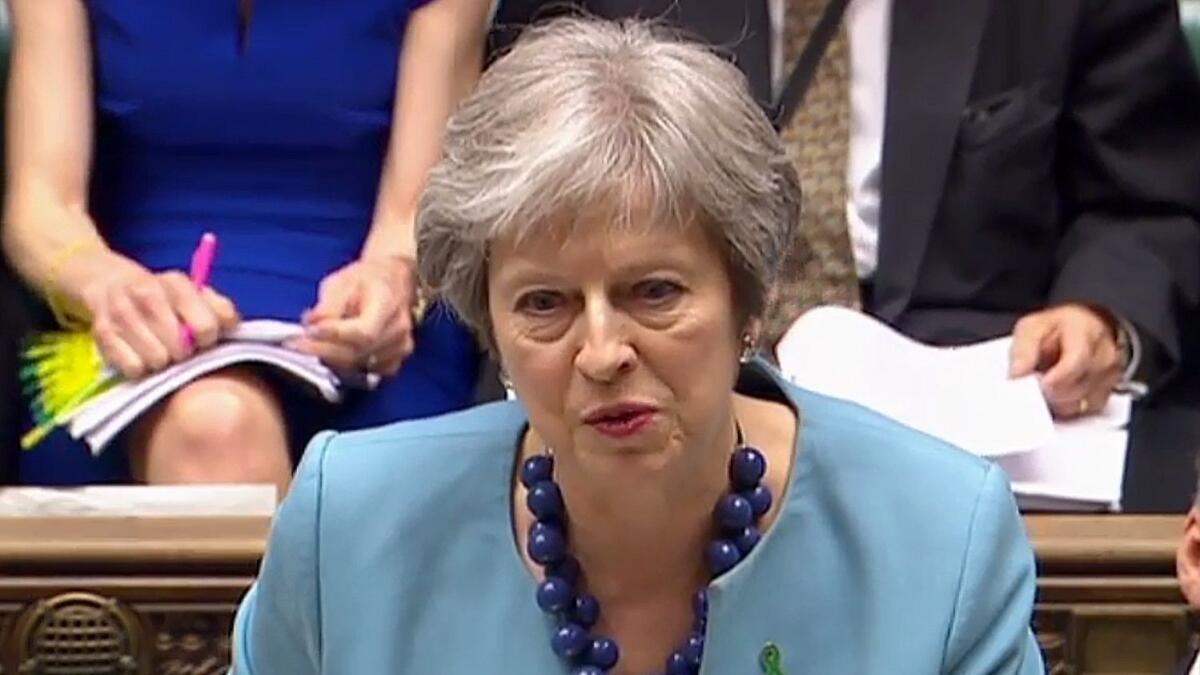British prime minister faces rebellion while working on deal to break from European Union

In the two years since the British electorate voted to leave the European Union, Prime Minister Theresa May has faced challenge after challenge as Britain struggles to determine what its future will look like.
But this week is likely to rank as one of the most pivotal as she faces the very real possibility of a rebellion within her party as lawmakers vote on a key piece of legislation on Britain’s EU exit, known as Brexit. Speaking to her Conservative Party colleagues on Monday, May pleaded with them to think deeply before breaking ranks.
“Think about the message Parliament will send to the European Union” if the government is essentially defeated, she said.
“I am trying to negotiate the best deal for Britain. I am confident I can get a deal that allows us to strike our own trade deals while having a border with the EU which is as frictionless as possible,” she told lawmakers. “But if the Lords amendments are allowed to stand, that negotiating position will be undermined.”
May is referring to more than a dozen amendments that Parliament’s upper chamber, the House of Lords, has made to the EU withdrawal bill, which will be debated Tuesday and Wednesday.
The bill would convert most EU laws into United Kingdom laws once Britain formally leaves the bloc, a guarantee the government sees as vital to a successful, smooth Brexit.
The House of Lords, which is overwhelmingly anti Brexit, has inserted 15 amendments that it believes are necessary to make the government adopt a softer negotiating stance that does not see Britain sever all ties with the EU.
For one, it asks May to negotiate a customs union with the EU, something that the prime minister has categorically said she will not do because — in her mind — leaving the EU means leaving the customs union as well.
Another sticking point is whether Parliament would be granted the power to demand that the government resume negotiations with Brussels if the final Brexit deal isn’t satisfactory.
The government vehemently opposes such a condition and has repeatedly said it would be willing to leave the EU without any deal at all if the one offered isn’t good enough. May is hopeful she can secure enough votes to reverse or at least significantly alter the House of Lords’ amendments, but her position is weak.
Last year’s elections unexpectedly wiped out her government’s majority and she is dependent on Northern Ireland’s Democratic Unionist Party to stay in power. Her party is also seemingly intractably divided by Brexit and a number of pro-EU lawmakers have implied they have enough votes to make May’s life very difficult this week, as they push for her to make more concessions in her Brexit strategy or risk a revolt.
“It’s a bit of a canary in a coal mine, it will serve as a warning,” said Anand Menon, professor of European politics and foreign affairs at King’s College London, explaining that how the next few days unfold will be critical to helping the government understand exactly how many rebels it may be facing on future Brexit votes.
So-called Brexiteers are also unhappy with May and reportedly already plotting a leadership challenge. Foreign Secretary Boris Johnson is widely believed to be one of the first in line, simply waiting for the right moment to try and secure the top job, with some surmising he may even try to make his move before Britain formally leaves the EU in March.
And there is always the risk that the more divided the Conservative Party becomes, the greater chance opposition Labor Party leader Jeremy Corbyn has of becoming prime minister.
Analysts and political pundits will be watching this week’s developments closely — as will Brussels, which has become increasingly frustrated at the infighting and indecision over what Brexit actually means and what it should look like. Just last week, there was a period of a few hours where it appeared as though the U.K.’s Brexit secretary, David Davis, was on the verge of resigning.
And over the weekend, it emerged that millionaire businessman Arron Banks, who funded former UK Independence Party leader Nigel Farage’s campaign to leave the European Union, had several meetings with Russian Embassy officials before the June 2016 referendum.
The scale and scope of these meetings are unclear, but a parliamentary committee is seeking to question him.
The clock is also now ticking down to a crucial EU summit at the end of the month where May is hoping to put forward a coherent set of proposals for her government’s Brexit policy and present a united front.
“Everything is critical now,” said Menon, adding that even if lawmakers fall in line over the next few days, the deep fissures that have been exposed are only likely to get worse.
“The real implications of this week are going to be visible later on,” he added.
Boyle is a special correspondent.
More to Read
Sign up for Essential California
The most important California stories and recommendations in your inbox every morning.
You may occasionally receive promotional content from the Los Angeles Times.










